So, you’ve found yourself in a “Friends With Benefits” (FWB) situation, but now you’re thinking it’s time to step back. It’s okay to reconsider and decide this relationship isn’t right for you. Let’s dive into why you might want to decline a Friends With Benefits arrangement and how to navigate this decision gracefully.
Understanding Friends With Benefits
- What is a Friends With Benefits Relationship?
A Friends With Benefits relationship is exactly what it sounds like friends who engage in a sexual relationship without the traditional expectations of a romantic commitment. It’s a way for people to enjoy intimacy without the strings attached to a typical relationship.
- Common Misconceptions
Many think FWBs are simple and hassle-free. However, they can often be more complex than anticipated. The lack of commitment can sometimes lead to misunderstandings or emotional complications.
- Benefits of a Friends-With-Benefits Relationship
On the surface, FWBs can offer convenience and fun. There’s no pressure to label the relationship; it can provide physical intimacy while maintaining independence.
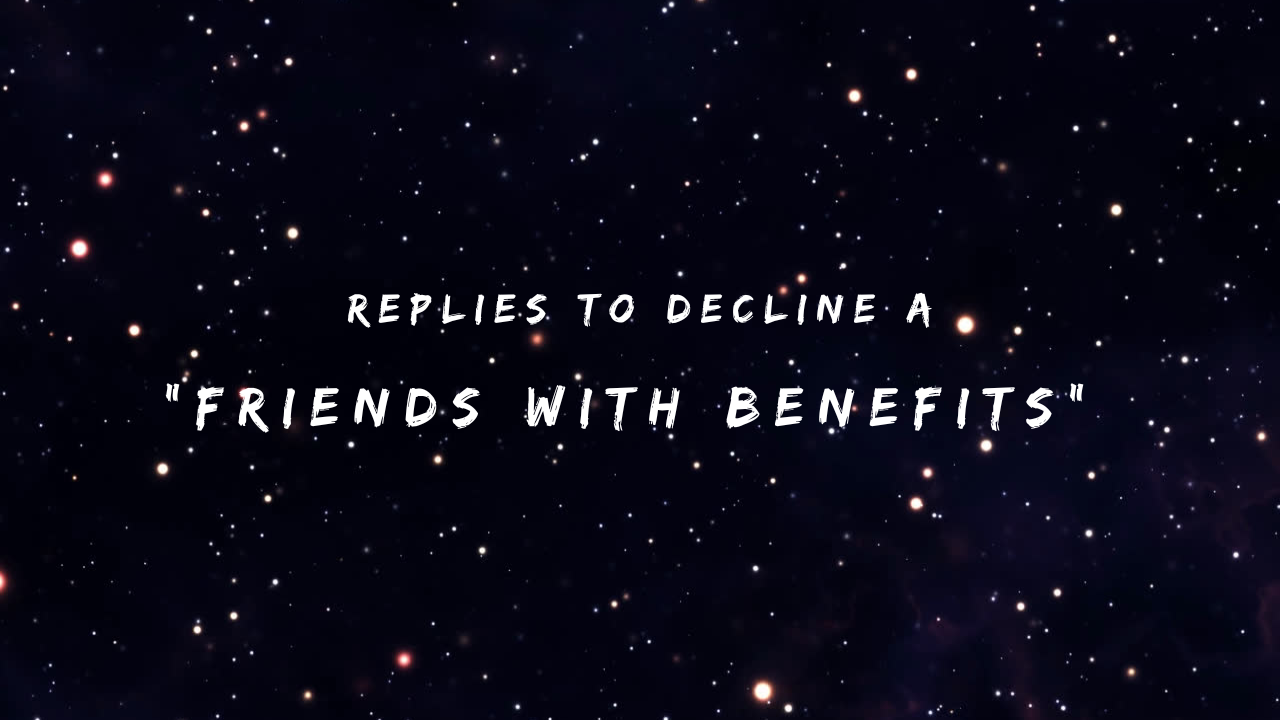
150+ Replies to Decline a “Friends With Benefits”
Polite and Respectful Decline
- I appreciate your honesty but am not interested in pursuing a friends-with-benefits relationship.
- Thank you for being open with me, but I think we’re looking for different things.
- I’m flattered by your offer, but I’m uncomfortable with a friends-with-benefits arrangement.
- I value our friendship and prefer not to complicate it with something like this.
- It’s kind of you to be upfront, but I’m not interested in that relationship.
- I’m grateful for your honesty, but I prefer to keep our relationship as friends.
- I respect your feelings, but I’m not in a place where I can accept that kind of arrangement.
- Thank you for sharing your thoughts, but I’m not looking for a friends-with-benefits setup.
- I appreciate your perspective, but I don’t think I can engage in that type of relationship.
- Thanks for letting me know, but I’m not interested in taking our friendship in that direction.
Clear Boundaries
- I’m uncomfortable with a friends-with-benefits arrangement and prefer to keep things as they are.
- I must be clear that I’m not interested in anything beyond friendship.
- I’m setting a boundary here—I prefer to remain just friends.
- I want to be upfront about the fact that I’m not open to a friends-with-benefits situation.
- To keep things straightforward, I’m not interested in crossing the line from friends to more.
- I want to respect our friendship by maintaining clear boundaries and not pursuing this.
- It’s important to me that we keep our relationship within the boundaries of friendship.
- I’m drawing a line here; I’d prefer to stay friends rather than complicate things.
- I’m unwilling to blur the lines between friendship and something more intimate.
- I hope you understand that I need to keep our relationship strictly platonic.
Personal Preference
- I prefer not to mix friendship with a romantic or physical aspect.
- I value keeping friendship and romance separate, so this isn’t something I’m interested in.
- I prefer to keep things simple and not engage in a friends-with-benefits relationship.
- I feel more comfortable with clear boundaries between friends and romantic interests.
- I prefer not to complicate our friendship with a physical or romantic arrangement.
- I’m looking for a different connection and not interested in a friends-with-benefits setup.
- It’s just not my style to mix friendship with physical intimacy.
- I would rather keep our relationship on a friendly and spiritual level.
- I’m more comfortable with relationships that don’t involve a friends-with-benefits dynamic.
- Maintaining a clear line between friendship and something more is important to me.
Relationship Goals
- I’m focused on finding a committed relationship, not something casual like this.
- I aim to build a meaningful and serious relationship, so this isn’t the right fit.
- I want to pursue a deeper, more committed connection than a friends-with-benefits arrangement.
- I want a relationship with clear intentions and goals, not a casual setup.
- My relationship goals involve more commitment and emotional investment than a friends-with-benefits situation.
- I’m seeking a long-term relationship and don’t think a friends-with-benefits arrangement aligns with that.
- I want something more serious and committed, so I must decline this offer.
- I’m interested in developing a more meaningful relationship, which doesn’t fit with a casual friends-with-benefits setup.
- I’m looking for something with more depth and commitment to my relationship goals.
- A friends-with-benefits arrangement doesn’t align with my vision for a serious and committed relationship.
Emotional Readiness
- I don’t feel emotionally ready for a friends-with-benefits arrangement right now.
- I’m currently not in a place where I can handle that kind of relationship.
- Emotionally, I’m not prepared for that setup and must focus on myself.
- I’m not in the right headspace for a friends-with-benefits situation.
- I need to decline because I’m not ready for the emotional complexities that might come with this.
- I’m not emotionally equipped to handle a friends-with-benefits relationship right now.
- At this time, I need to prioritize my emotional well-being, so I can’t engage in that kind of arrangement.
- I don’t think I’m ready to navigate the emotional aspects of a friends-with-benefits relationship.
- My current emotional state prevents me from forming a casual relationship.
- I’m currently focusing on my emotional health and don’t think I can handle a friends-with-benefits setup.
Ethical or Moral Standpoint
- My values don’t align with having a casual relationship like this, so I must decline.
- I believe in keeping relationships straightforward, and this doesn’t fit with my ethical views.
- From an ethical standpoint, I prefer not to engage in a friends-with-benefits arrangement.
- I have personal principles that guide my relationships, and this arrangement doesn’t fit them.
- Certain moral standards guide me, and I don’t feel comfortable with a friends-with-benefits relationship.
- My ethics lead me to avoid casual arrangements like this.
- I prefer to adhere to my values, which don’t support this relationship.
- For ethical reasons, I need to pass on this type of relationship.
- My moral compass points me towards more committed relationships rather than casual ones.
- Certain beliefs about relationships make me uncomfortable with a friends-with-benefits setup.
Impact on Friendship
- I’m concerned that this could affect our friendship negatively, so I’d prefer to keep things as they are.
- I value our friendship too much to risk complicating it with a friends-with-benefits arrangement.
- I think mixing friendship with a casual relationship could create issues between us.
- I want to protect our friendship and avoid any complications that might arise from this kind of arrangement.
- I’m worried that this could harm our friendship, so I must say no.
- I’d rather not introduce a romantic or physical element to preserve our friendship.
- We should stay friends and avoid any risk of complicating our relationship.
- The potential impact on our friendship is a concern, so I’d prefer to keep things platonic.
- I’d like to maintain the integrity of our friendship without adding a friends-with-benefits dynamic.
- I don’t think we should explore this type of relationship to keep our friendship strong.
Honest Reflection
- After reflecting on this, I don’t think a friends-with-benefits relationship is right for me.
- I’ve given it some thought and realized I’m uncomfortable with this arrangement.
- I’ve thought about it and don’t believe this relationship would be a good fit for me.
- Upon reflection, I’ve decided that I’m not looking for a friends-with-benefits situation.
- I’ve considered this carefully and feel that I need to decline.
- After honest reflection, I’ve concluded this isn’t the right path.
- I’ve thought about it, and I don’t think this arrangement aligns with what I want.
- My reflections lead me to believe that a friends-with-benefits relationship isn’t suitable for me.
- Based on my conclusion, I’ve given it serious thought and need to decline.
- After reflecting on my needs and desires, I don’t think I can agree to this relationship.
Direct and Firm
- I’m not interested in a friends-with-benefits relationship, so I have to decline.
- I need to be straightforward—I’m not open to this arrangement.
- I won’t pursue a friends-with-benefits situation, so I must say no.
- I’m uncomfortable with this type of relationship and need to decline.
- I must be firm and say I’m not interested in a friends-with-benefits setup.
- I’m not willing to engage in a friends-with-benefits arrangement, so I’m declining.
- I want to be clear that I’m not open to this kind of relationship.
- I must decline this proposal as I’m not interested in a friends-with-benefits dynamic.
- I’m not pursuing a casual arrangement like this, so I must say no.
- I’m not interested in a friends-with-benefits relationship, and I’m firm on that.
Future Considerations
- Looking ahead, I’m focusing on more serious and committed relationships.
- For my plans, a friends-with-benefits arrangement doesn’t align with what I’m seeking.
- Considering my long-term goals, I need to pass on this type of relationship.
- I’m thinking about what I want for the future, which doesn’t fit those plans.
- I’m focused on building a more committed relationship for the future, so I need to decline.
- My future aspirations involve something more meaningful than a friends-with-benefits situation.
- For where I see my life going, this type of arrangement doesn’t fit with my future goals.
- I’m planning for a future that involves deeper connections, so I need to say no.
- Looking towards the future, I’m interested in relationships that offer more than a casual arrangement.
- I need to focus on more serious and committed relationships for my long-term vision.
Seeking Clarity
- I’d like to understand more about this arrangement before deciding.
- Can we discuss this in more detail? I want to be sure I understand what’s being proposed.
- I’m not entirely clear on what you’re looking for—can we talk more about it?
- Before I decide, I need a better understanding of what a friends-with-benefits relationship means to you.
- I need clarity on how this arrangement would work before responding.
- Could we clarify what this would entail? I want to make sure I fully understand.
- I’d like to discuss the specifics more to see if this aligns with what I seek.
- Can we talk more about what you mean by friends with benefits? I need more information.
- I’m seeking more clarity on this proposal to see if it aligns with my needs.
- Before deciding, I need to understand better what a friends-with-benefits relationship would involve.
Acknowledging Feelings
- I understand where you’re coming from, but I don’t think I’m comfortable with this arrangement.
- You’re interested, but I cannot engage in a friends-with-benefits relationship.
- I appreciate your feelings, but I’m not comfortable with the idea of a friends-with-benefits arrangement.
- I understand your perspective, but I must be honest and say I’m not interested in this relationship.
- I acknowledge your interest, but this arrangement doesn’t work for me.
- I get that this might be what you’re looking for, but it’s not something I can agree to.
- I see where you’re coming from, but I need to be clear that this isn’t something I’m open to.
- I respect your feelings, but I’m not in a place to accept a friends-with-benefits setup.
- I understand that you’re interested in this, but it’s not something I can participate in.
- I appreciate your openness, but I must decline based on my comfort level.
Emphasizing Friendship
- I value our friendship too much to introduce a friends-with-benefits dynamic.
- Our friendship means a lot to me; I’d rather keep it as it is.
- I’d like to maintain our strong friendship without adding a romantic element.
- I think it’s best to preserve our friendship by not pursuing a friends-with-benefits arrangement.
- Our friendship is important, and I’d prefer to keep it uncomplicated.
- Keeping our relationship purely friendly is the best way to preserve our bond.
- I want to continue valuing our friendship without complicating it with a friends-with-benefits setup.
- I need to decline this proposal to keep our friendship strong and uncomplicated.
- I’d rather focus on maintaining our friendship than risk it with a different dynamic.
- Our friendship is best left as it is, without introducing a romantic or physical aspect.
Self-Respect
- For my sense of self-respect, I need to decline this type of arrangement.
- Maintaining my self-respect means avoiding relationships that don’t align with my values.
- I need to prioritize my self-respect, which leads me to decline this proposal.
- To maintain my self-respect, I’m not open to a friends-with-benefits situation.
- Respecting myself means sticking to relationships that are more aligned with my values.
- For the sake of my dignity, I need to say no to this type of arrangement.
- My self-respect guides me to avoid casual relationships like this.
- I must respect myself and boundaries, so I’m not interested in a friends-with-benefits setup.
- I’m choosing not to engage in this kind of relationship to keep my self-respect intact.
- Maintaining my self-respect means avoiding any arrangement that doesn’t fit my values.
Future Vision
- My vision for the future involves building a deeper, more committed relationship, so I need to pass on this.
- I see myself in a more serious relationship than a friends-with-benefits setup.
- I aim for something more substantial than a casual arrangement for my long-term vision.
- I’m planning for a more committed future, so I need to decline this proposal.
- My future goals are focused on a meaningful relationship, not a friends-with-benefits arrangement.
- Considering my aspirations for the future, I need to opt for relationships that align with those goals.
- My vision for the future includes deeper connections, so a friends-with-benefits situation doesn’t fit.
- I’m thinking about where I want to be in the future, and this arrangement doesn’t align with that.
- I need relationships that offer more depth and commitment for the future I envision.
- My plans involve pursuing more serious and committed relationships, so I need to say no to this.
Reasons for Declining a Friends With Benefits Relationship
- Emotional Readiness
One primary reason for wanting to decline an FWB arrangement is emotional readiness. Maybe you’re looking for something more meaningful, or you find the casual nature of the relationship emotionally taxing.
- Personal Values and Beliefs
Sometimes, personal values or beliefs don’t align with the concept of FWBs. If your values revolve around traditional relationships or commitment, stepping away from an FWB setup is perfectly valid.
- Desire for a Committed Relationship
An FWB might not meet your needs if you’re yearning for a committed relationship. Recognizing when you’re ready for a deeper, more dedicated connection is important.
- Impact on Existing Friendships
An FWB arrangement can sometimes strain existing friendships. It might be worth reconsidering if you’re concerned about how this might affect your broader social circle.
- Potential for Complications
FWBs can become complicated, especially if feelings develop or one person wants more than the other can offer. This can lead to tension and discomfort, making it a good reason to reevaluate the situation.
Assessing Your Feelings
- Self-Reflection: What Do You Want?
Before making a decision, take a moment to reflect on what you truly want from your relationships. Are you seeking something more serious or fulfilling? Understanding your desires can clarify your next steps.
- Evaluating the Emotional Impact
Consider how the FWB relationship affects your emotions. If you’re feeling more distressed or confused than satisfied, it’s a sign that it might not be the right fit.
- Identifying Personal Boundaries
Knowing your boundaries is crucial. If the FWB relationship pushes your boundaries or makes you uncomfortable, it’s important to recognize this and act accordingly.
Communicating Your Decision
- How to Approach the Conversation
When you’re ready to decline the FWB arrangement, approach the conversation carefully. Being honest and considerate of the other person’s feelings is essential.
- Choosing the Right Time and Place
Timing and setting matter. Choose a calm and private environment to discuss your decision, ensuring you both have the space to express yourselves openly.
- Being Honest but Considerate
Be clear about your reasons for ending the arrangement, but be gentle. You don’t need to go into every detail, but honesty is key.
- Handling Potential Reactions
Be prepared for various reactions. The other person might be surprised, disappointed, or even upset. Stay calm and empathetic, and give them space to process their emotions.
Alternatives to Friends With Benefits
- Exploring Other Types of Relationships
If you’re looking for something different, consider exploring other relationships that align better with your goals and values.
- Building a Deeper Connection with Someone
Invest time building a deeper connection with someone who shares your long-term relationship goals. This can be more fulfilling and align better with your personal needs.
- Focusing on Personal Growth
Use this time to focus on your personal growth and development. Engaging in activities you love and pursuing personal goals can be incredibly rewarding.
Coping with Rejection and Moving On
- Dealing with Your Own Emotions
It’s natural to feel a mix of emotions after declining an FWB relationship. Allow yourself time to process these feelings and seek support if needed.
- Maintaining or Redefining the Friendship
If the FWB was with a friend, consider how you might maintain or redefine the friendship. Communication is key to navigating this transition smoothly.
- Moving Forward in a Healthy Way
Embrace this as an opportunity for growth. Moving forward with clarity and self-awareness will help you establish healthier relationships in the future.
Conclusion
In conclusion, navigating the end of a “Friends With Benefits” arrangement can be challenging, but with the right approach, you can handle it respectfully and clearly. Remember, it’s important to communicate your feelings honestly while considering the other person’s emotions. Whether you’re looking for a way to decline or seeking advice on gracefully
How to respond to other tricky questions, like:
Respond “Are You Seeing Anyone?” with 150+ Answers
FAQs
Q. How can I know if I’m ready for a Friends With Benefits relationship?
Consider your emotional readiness and what you want from the relationship. It might be right for you if you’re comfortable with the casual nature and clear about your boundaries.
Q. What if the other person doesn’t understand my decision?
Be honest and patient. Give them time to process and understand your perspective. Clear communication can help bridge any misunderstandings.
Q. Can a Friends With Benefits relationship turn into something more serious?
It’s possible but not always likely. If both parties develop deeper feelings and are on the same page, it can evolve into a more serious relationship.
Q. How do I handle awkwardness after declining?
Acknowledge the awkwardness and communicate openly. Discuss how you both want to move forward and find a way to navigate the new dynamics.
Q. What should I do if I regret my decision?
If you regret your decision, consider why and talk to the person involved. Open communication can help you address any unresolved feelings or misunderstandings.
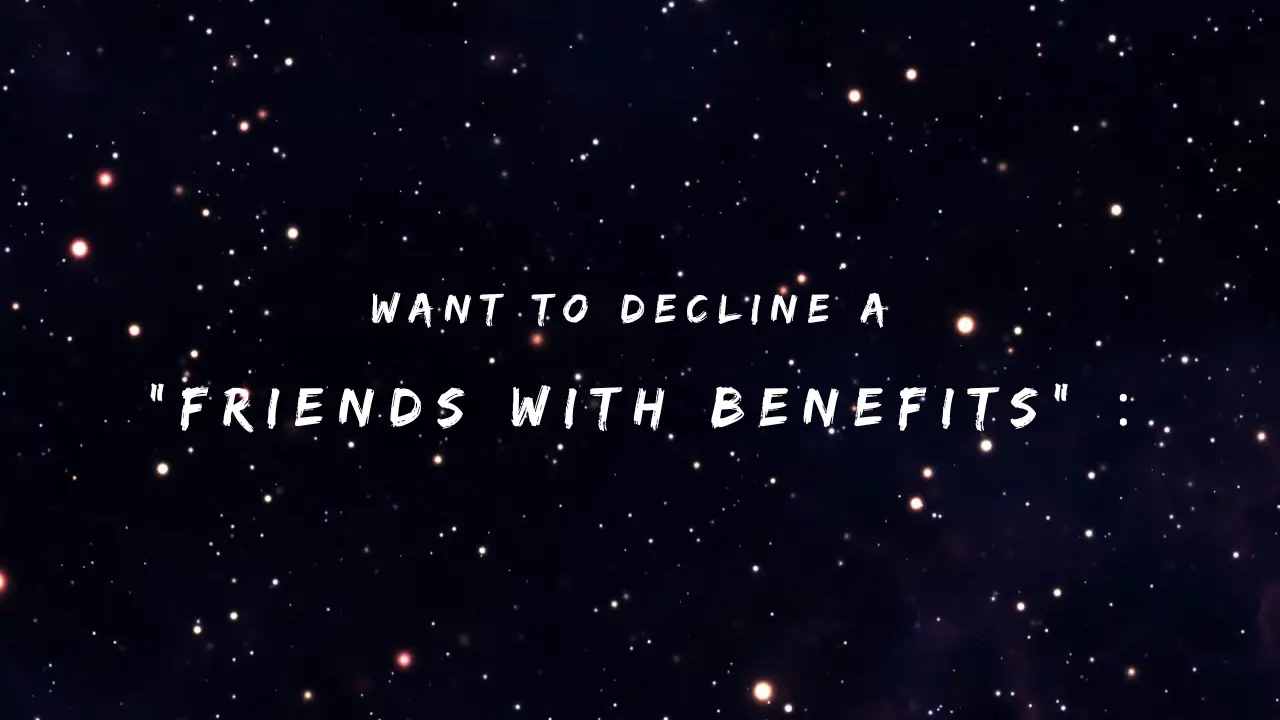

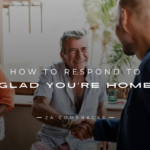
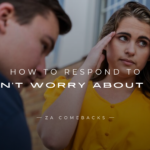


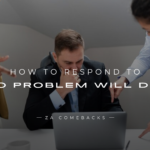




0 thoughts on “Want to Decline a “Friends With Benefits” : 150+ replies”